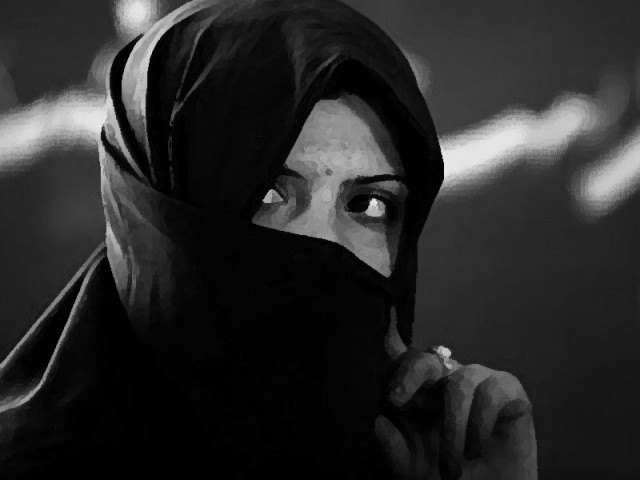Rape victims suffer in silence after Hindu - Muslim riots in India
Police say they have registered only five sexual violence cases from the riots from 282 criminal cases overall.

Police say they have registered only five sexual violence cases from the riots from 282 criminal cases overall. PHOTO: FILE
"There were six of them. They tied me to a chair and raped my young girl one by one. I could do nothing to save her," Fatima said with tears welling up at a relief camp a few hours drive from New Delhi.
The family of seven was left shattered by the attack on the 17-year-old, which came during riots between Hindus and Muslims in and around Uttar Pradesh's Muzaffarnagar district last month that killed at least 50.
Yet they have chosen not to report the matter to the police.
"If the word spreads that my daughter was gang-raped, tell me who will marry her? She will be branded as dirty and we will be thrown out of our own community," Fatima told AFP at the camp in Malakpur where nearly 10,000 Muslims are sheltering.
Her story is just one among many, indicating that as well as arson and beatings, sexual violence was rampant during the three-day riots, which started on September 7.
But police say they have registered only five sexual violence cases from the riots from 282 criminal cases overall.
"We are investigating each case carefully," Kalpana Saxena, a senior police officer told AFP.
The carnage was triggered by the killing of a Muslim man, allegedly by members of the dominant Jat Hindu family who accused him of sexually harassing their sister.
The Muslims then allegedly killed two Jat boys, leading to violence that fast spiralled out of control.
Local political leaders were accused of encouraging the violence to polarise the state along religious lines ahead of general elections next year.
Naushad Ahmad Khan, a lawyer and activist who owns an ancestral house in Muzaffarnagar's Lank village, said women were reluctant to complain because of the fear of reprisals and a lack of faith in the police and courts.
"Even by most conservative estimates, there must be at least 50 cases of gang rape alone," said Khan, who has filed a public interest case in the Supreme Court, seeking a probe.
"Their attackers know them. They have been making threatening phone calls, asking them not to reveal their names to police.
"Then there is family honour which is at stake. For these women, rape is something to be ashamed of."
The decision to suffer in silence reflects the stigma attached to rape, especially in deeply patriarchal societies in rural India.
It also casts doubt on a growing narrative that the fatal gang-rape of a 23-year-old student on a bus in New Delhi in December represented a turning point for attitudes towards women.
The bus rape was followed by weeks of street protests, leading to the strengthening of laws and talk of how more women felt encouraged to report sexual crimes.
Fatima and others in the camp have vowed never to return to their villages despite the prospect of living in slum-like conditions without clean drinking water or proper toilets.
"I was trying to escape on a scooter with my grandfather when a mob of six men stopped us," said one 19-year-old woman, who looked frail and sickly, her face covered with a traditional scarf.
"They dragged me to nearby sugarcane fields. For six hours I was violated. I was finally rescued when an army patrol heard my cries."
Aneesa Begum, 40, recounted how rioters "hacked" the legs of her husband as she huddled under a blanket.
"They are not outsiders, they are village people. How can we face them again?" she said between sobs as she prepared to visit her husband in hospital.
Activists say women have had trouble convincing police to file charges, a common occurrence in rural India where rape victims are sometimes encouraged to marry their attackers.
"Some of the rape survivors have shown courage and approached the police. But when they see that no action has been taken against their attackers, others also get demoralised," said Sehba Farooqui of rights group the All India Democratic Women's Association.
"By the time the women gather courage to go to police, medical evidence is no longer there. Delays make it legally difficult for the attackers to be punished," she said, urging the government to set up fast-track courts like the one used for the Delhi gang-rape case.
New York-based Human Rights Watch has called on the government to provide counselling as well as legal and medical aid to victims.
"The Uttar Pradesh government needs to urgently create an environment for victims to come forward and seek justice," said Meenakshi Ganguly, HRW's South Asia director.
Uttar Pradesh is India's most populated state with Muslims accounting for nearly 19 percent of the total population of nearly 200 million.
So far police have made about 150 arrests over the violence, including four politicians accused of inciting marauding mobs.
"All the political parties are only interested in winning votes. The police is also hand-in-glove with them," said Begum.
"Who will fight for us? We will have to suffer in silence all our lives."



















COMMENTS
Comments are moderated and generally will be posted if they are on-topic and not abusive.
For more information, please see our Comments FAQ